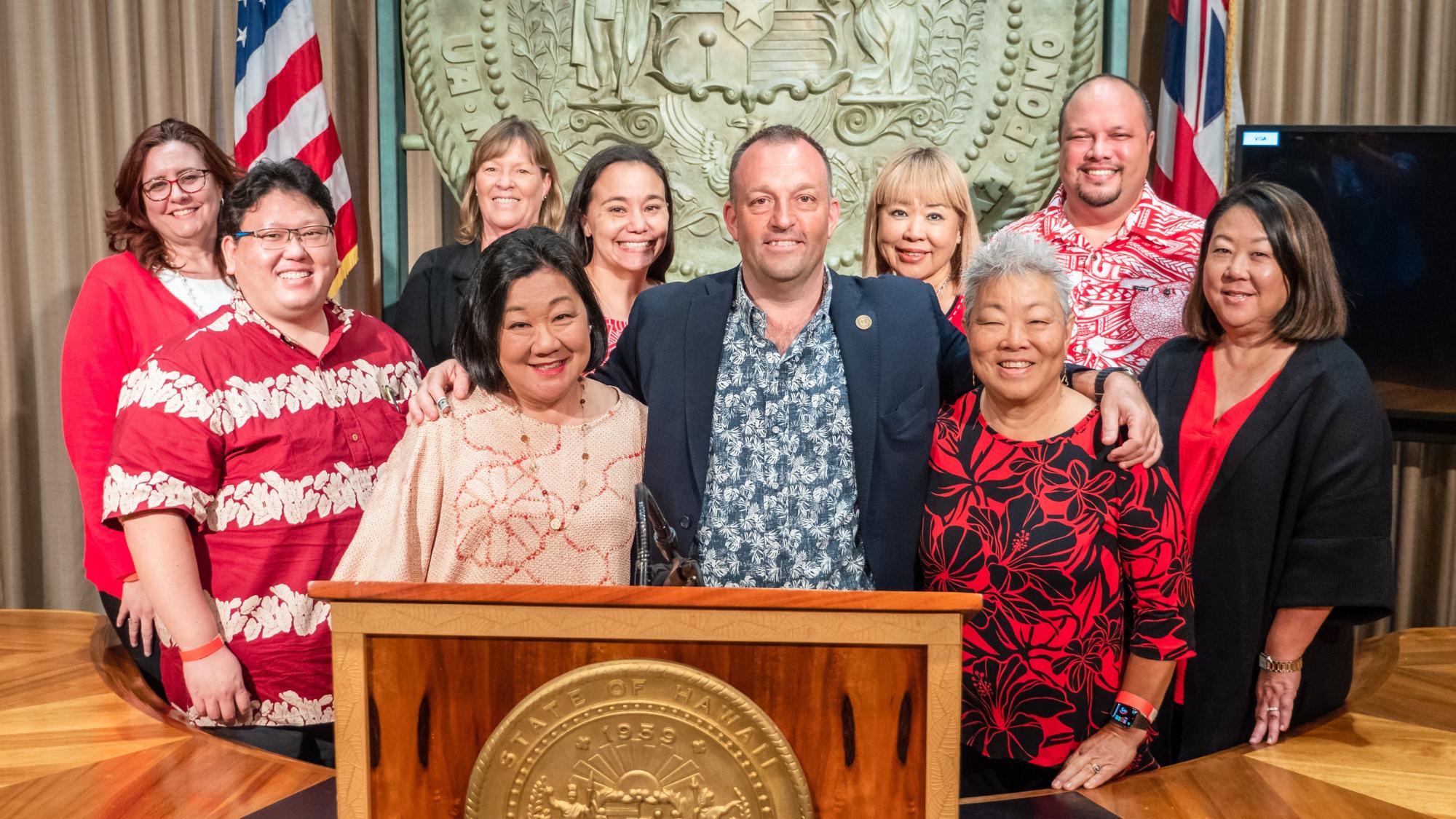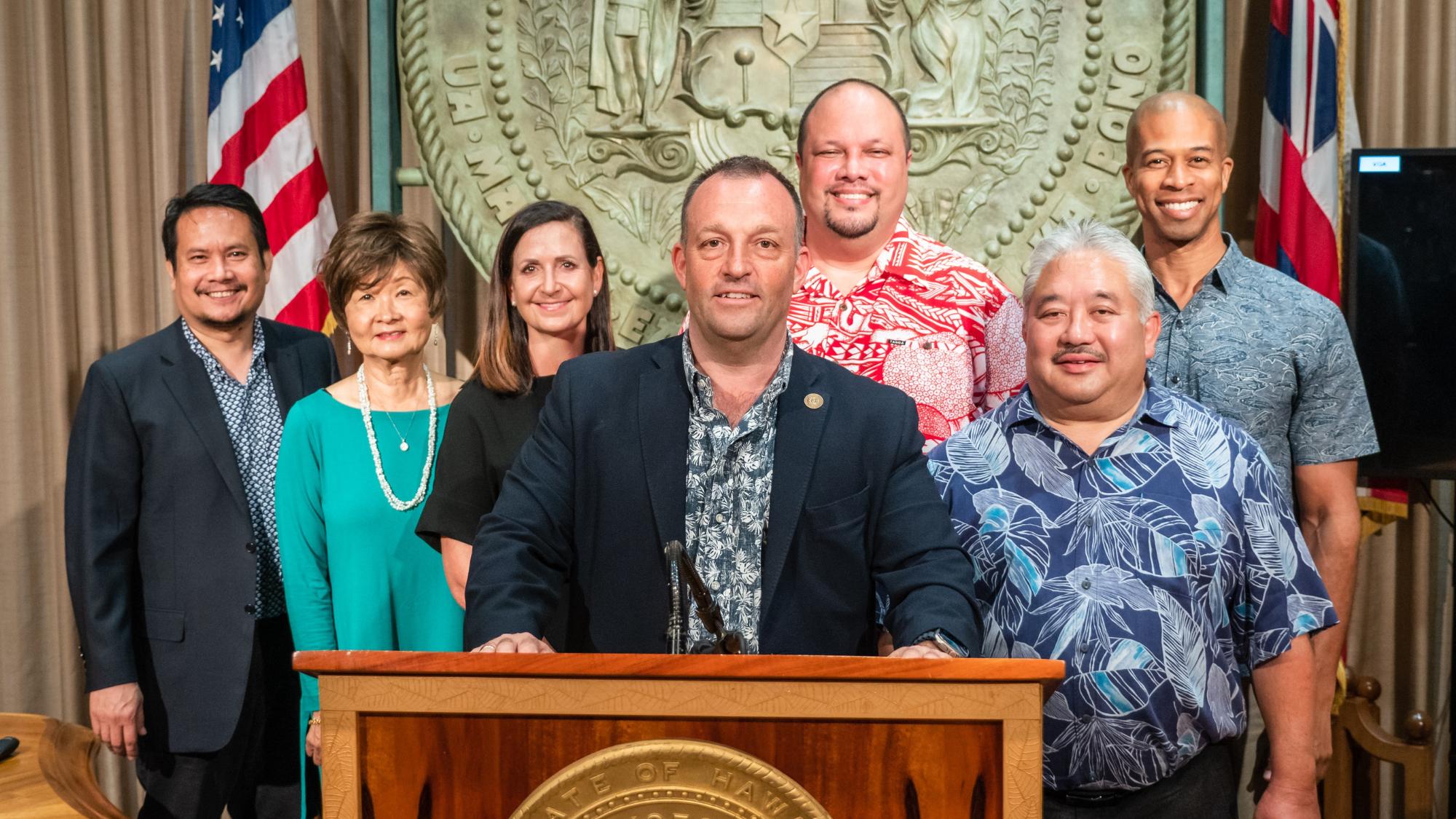Recruitment, retention, need for a living wage underscored collaborative discussions
Posted: April 17, 2023
Gov. Josh Green, Hawaiʻi State Department of Education (HIDOE) Schools Superintendent Keith Hayashi, and Hawai‘i State Teachers Association (HSTA) President Osa Tui, Jr. stressed Monday the importance of a new contract that provides public school educators with stronger wages, and incentives to live and work in Hawaiʻi.
The trio spoke at a joint press conference following HSTA’s announcement of a tentative, four-year contract settlement for 13,500 Bargaining Unit 05 teachers, counselors, and librarians represented by the union.
“We value our teachers incredibly and we know that they are the bedrock of our society,” Green said. “These are people that take care of our keiki. They educate them, they bring about the change that we need into the future, and so from the start, we felt that we had to pay teachers well enough to show that we not only respect them, but that they can live in Hawaiʻi.”
The deal proposes 14.5% pay increases over the life of the contract — from July 1, 2023, through June 30, 2027 — as well as increases in the employer contribution to health premiums, supplementary pay, and changes in the salary structure, from the creation of a Class VIII to modifications to instructor pay on the schedule, including streamlining, expanding, and significantly boosting amounts.
HSTA: First negotiations in 10 years with substantive changes
HSTA President Tui said this is the first negotiation in a decade that yielded substantive changes, resulting in “the strongest contract I believe we’ve ever had.”
Tui elaborated, “We were coming off some pretty rough times in negotiations, so we said we wanted to sit down, we’ve got to hash things out, so 2013, we did that. In 2017, it was more, ‘Here’s some money. Do you want the money? We’re not going to discuss anything else.’ And ultimately, our teachers said sure, we’ll take the money. Then in 2021, COVID, yeah, so there were issues there. So this is really the first time we’ve been able to say we want to sit down, have substantive conversations, open the whole contract, look at different things, and we did.”
Salary boost for new, veteran educators
Superintendent Hayashi said, “This agreement helps set a solid foundation for the next four years with predictable increases that recognize the incredible work of the educators in our schools who directly support student learning.
“It also elevates the teaching profession across the pipeline – from beginning teachers to veteran teachers to non-traditional teachers – while supporting their continued professional growth,” Hayashi added.
All three stressed the importance of supporting new and veteran educators. Under the contract, emergency hire teachers would see a boost to starting salaries from $38,521 to $50,325.
Green explained, “Previously, if you had one teacher at entry level and a significant other taking care of their child at home, young child, they’d be living below poverty and would need Medicaid health insurance. Now, starting someone at $50,000, maybe their significant other, their spouse, works halftime. They’re lifted out of poverty. So it’s really just unconscionable that a teacher would have to live near poverty, frankly.”
Tui thanked the governor for stepping in to help resolve sticking points on the final day of bargaining; one of which led to the creation of a Class VIII to elevate approximately 4,000 veteran teachers, boosting their pay by another 4%.
Green said, “We felt that was very important because we’re constantly over 1,000 teachers short, and I really didn’t want to see us experience early retirements. There was going to be more money, because our economy is good, but that might not have benefited teachers that are already committed 15, 17, 20 years, and so we had some debates and I just thought, you know, let’s set aside differences and make sure it was not too difficult, that it was reasonable to go to the next class.”
Tui said, “Ultimately, this is going to help with recruitment and retention. What does that do? It helps with our keiki who are in our classrooms who are going to have highly qualified educators more now than before. That’s what we need.”
Process for emergency closures, additional challenges
Another sticking point was how to minimize learning loss during emergency school closures in situations that could range from an unexpected water main break to the coronavirus pandemic. The agreement includes a four-year pilot program that includes a definition of “emergency” and how and when a school is closed; requires notice of the closure to HSTA; and allows for a pivot to an alternative instructional mode if the closure will be for more than three days.
Green said, “It was very traumatic for teachers and parents because of the (COVID) experience, and so we really wanted to make sure we were respectful of both sides. Though we don’t anticipate a scenario like that again, and now we’re much better equipped than ever before, if there’s a crisis to pivot, we needed to have some clarity on what would happen.”
The governor acknowledged additional obstacles during the bargaining process, including a reduced state budget surplus and pending initiatives to support struggling families.
“One of the most important things our administration is fighting for is the gap plan, our affordability plan, which is a tax break, for people that are living essentially paycheck to paycheck, These are often described as ALICE (Asset Limited, Income Constrained, Employed) families,” Green said. “But many teachers are living paycheck to paycheck, and month to month, because of the cost of housing, and so in order to afford our tax package, which is critical, and at the same time afford to pay people well so that we can recruit teachers and keep experienced teachers, that was important.”
Average teacher salary to increase by at least $10,000
This contract, if approved, will have a price tag of $577 million over four years. The average teacher salary is anticipated to rise by at least $10,000 from the current $71,000 and does not factor in the additional opportunity for teachers to reclassify using professional development credits to the new Class VIII.
The governor had a message for all educators: “I hope in my heart that you feel this is a good deal. We’ve worked very hard to respect your leadership and to respect you as we go forward. Teaching is the way we elevate our society. Wages have to increase, quality of life has to be addressed, and I think that’s what’s done in this contract. We could always find ways to ask for more, and we will, going forward, for all the people in the state. We’re going to try to elevate everyone. But we wanted to do this first and demonstrate our commitment to education.”
The HSTA will conduct a statewide, in-person contract ratification vote on April 26.

From left: Andrea Eshelman, HSTA chief negotiator and deputy executive director; Aaron Kubo, HSTA NEA Director; Jenne Olayon, HSTA Negotiations Committee vice chair, Hilo Chapter member (back); Colleen Bird, HSTA negotiations and research specialist; Logan Okita, HSTA vice president; Gov. Josh Green; Ann Mahi, HSTA Executive Director (back); Diane Mokuau, HSTA Negotiations Committee chair, Molokaʻi Chapter member; Osa Tui, Jr., HSTA president; Kathy Shibuya, HSTA Negotiations Committee member, Kauaʻi Chapter member.

From left: Luis Salaveria, Department of Budget & Finance director; Lynn Fallin, Board of Education member; Brenna Hashimoto, Department of Human Resources Development director; Gov. Josh Green; Osa Tui, Jr., HSTA president; Keith Hayashi, Hawaiʻi State Department of Education schools superintendent; Rep. Justin Woodson, House Committee on Education chair.
